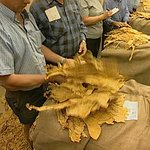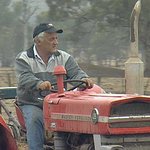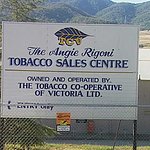
Tobacco industry up in smoke
Reporter: Tim Lee
First Published: 10/06/2007
SALLY SARA, PRESENTER: The death knell has sounded for that most unloved of industries, tobacco. It wasn't due to the efforts of the anti-smoking lobby or government health campaigns. Instead, a decision by the nation's two major companies which spelt the end for Australian tobacco growers.
British American Tobacco and Philip Morris both argued the locally grown crop was simply uncompetitive. For growers, the industry's closure has been softened by financial compensation but the smoke hasn't cleared on an industry still caught up in controversy.
TIM LEE, REPORTER: Autumn brings spectacular colour to the Victorian mountain town of Myrtleford.
For much of its history, Autumn also meant the harvest season of a far more lucrative golden leaf. Tobacco.
But this year, for the first time in three quarters of a century, the aromatic smell of tobacco leaves curing in the kilns doesn't waft through these picturesque valleys.
And, critically, its lucrative returns aren't flowing through the community.
JOHN MURACA, CHAIR, TOBACCO GROWERS' CO-OP OF VICTORIA: The growing side of it was $26, $27 million. Our wages on the threshing plant staff and plant was $1 million. The multiplier effect would be around $90 million lost to the valley. When you believe that.... when you see that the valley is a very narrow valley, The Buffalo, The Ovens, The King and the Kiwa, it's a lot of money coming out of a very small area and towns like Myrtleford are suffering.
TIM LEE: On October 26 last year, Australia's tobacco growing industry took its last breath, when the majority of the region's 143 licensed tobacco growers voted to accept a Federal Government and industry buy out.
PETER ANDRONELLO, FORMER TOBACCO GROWER: I don't think this town will really know what's gonna happen for two years and there's no... you walk into town now and there's no atmosphere. It's just feels cold and no one's speaking. So it's not real good.
TIM LEE: The demise of tobacco spells profound economic and cultural change for this region. For tobacco growers, Autumn was always the busiest time. The harvesters moved up and down the luxurious lime green rows like mechanical caterpillars as pickers worked hard hand picking the leaf before the season's first frosts wilted the crop.
It was a labour intensive task which often relied on guest labour from Fiji. Now, the harvesters stand idle.
ALAN MCGUFFIE, FORMER TOBACCO GROWER: That machine over there was the one we rode on four years ago. When you took the shod of the industry, the state of repair it's in at the moment is because we're just putting a new motor into it and then we found out that same week that the tobacco industry had... was closing down, so it's there, it's probably a $50 or $60,000 machine. I suppose now you'd be lucky to get $5,000 scrap metal. And the rest of the sheds all the way through here, all this machinery, it's the same, it's all specialised tobacco equipment. It's now obsolete, just sitting there rotting.
TIM LEE: But though the sudden end to the industry caught many by surprise, most growers realised they were on shaky ground. A third of Victorian growers took a voluntary buy out in the early 1990s. Growers on Queensland's Atherton Tablelands accepted a buy out and picked their last crops two seasons ago.
Australia's industry faced mounting pressure from the anti smoking lobby, and scant support from government. And control was in the hands of two big multinationals, British American Tobacco and Philip Morris Limited, who continually warned that Australian tobacco was too expensive and that quality wasn't high enough to compete with the likes of China, India and Brazil.
ALAN MCGUFFIE: We were told that there was you know, $80, $90 million worth of savings over two years by not purchasing our tobacco, our tobacco was too dear compared to world markets, so they've bought us out with a $20 million, $30 million package, saved that money, and someone in New York will be happy because the industry has closed down but not all the farmers here.
JOHN MURACA: The manufacturers are able to bring down the Australian content of the cigarette from 57 per cent to just on 12 per cent last year. So they were able to do that without the consumer realising they weren't smoking tobacco with Australian tobacco in it. So it wasn't very hard to go from 12 per cent to nothing. While rising production costs, especially for fuel to power machinery, and for running tobacco kilns, had trimmed profit margins, in economic returns, no crop came close to tobacco.
MICK DE FAZIO, FORMER TOBACCO GROWER: There's nothing I don't think that's ever gonna replace what tobacco was bringing in per acre. It's been a tough year are, especially this year, losing tobacco, the grapes, whoever is in the grape industry has felt it too with the drought and smoke effect and a lot of frosts that we've had. So I think the community's gonna be suffering for quite a long time. It's gonna take a long time to recover.
TIM LEE: This is the first rain in three months. Though it does little to ease the sense of disquiet here.
In reality, had growers planted in November, this year's crop would've withered well before harvest. Tobacco is a thirsty plant, and days after Christmas, the drought forced a suspension of irrigation entitlements.
JOHN MURACA: Speaking to older growers, my father who has been in Australia since '38 can never remember a season as tough as it. I believe that if we had have voted to continue to grow, a lot of us would've went to the wall.
TIM LEE: Post-tobacco, the chairman of the Tobacco Growers Co-Op of Victoria, John Muraca, a third generation grower, says he's content to pursue a less hectic life raising cattle.
But he and other board members are in the sights of tobacco growers who don't accept that this is the end.
JOHN MURACA: ...First meeting after the actual vote.
CARLO MANCUSO: I don't believe yet that it is over. We have an infrastructure here that can grow tobacco. We have the knowledge to grow tobacco, where a lot of countries don't have an infrastructure, don't have the knowledge to grow tobacco, would like to grow tobacco, here we are, we have all that.
TIM LEE: These tobacco plants, the selfsame remnants of last year's crop are all that remains of Australia's once booming tobacco industry. Indeed it might be the last time ever you see such a plant grown on an Australian field.
But while some in this district won't accept that the industry has come to an end, to resurrect it they'll have to first overcome some seemingly insurmountable obstacles.
Carlo Mancuso recently led a group of growers on a research trip overseas and he believes they can produce high-quality tobacco at a competitive price to meet niche export markets. But they face stiff competition from two multinational tobacco companies.
COLIN MCCORMACK, TOBACCO GROWERS CO-OP OF VICTORIA: Could be... It'll be a very small market, I feel, where the Barters, the Philip Morris, they control the world industry. They'd have to find a market well away from them. We must remember why this industry closed down. It was because our tobacco was too highly priced.
TIM LEE: The barriers are not only commercial. The Australian Taxation Office, which controls tobacco production in this country, says growers who want to stay in business will have to meet much tougher controls.
They'll have to show they have a genuine export market with binding contracts, improved farm security and there'll be limits on the amount of leaf they can grow.
And that's because of the way organised crime has moved into the illegal tobacco market. As Landline reported four years ago, chop chop, the illegal tobacco trade, is big business.
(To farmer)Are these pretty hardened criminals?
FARMER: Yes they are, and they will go to any extent to get their gain and as a result of that, we are concerned about assaults, serious assaults, and we've been able to connect one particular murder to a chop chop situation.
TIM LEE: A report being prepared by accountants PriceWaterhouseCoopers estimates that Australia's illegal tobacco trade is worth nearly half a billion dollars a year. Victorian growers typically received $700 for a 100 kilogram bale of leaf. By the time that same tobacco found its way to the shops, the Federal Government had reaped a staggering $30,000 in excise. At harvest time, the Victorian Tobacco Growers Cooperative held $1 billion in excisable product behind its 28 strand electric fence.
The apparent close of the domestic industry is being welcomed by law enforcement agencies.
LINDSAY CUMMINS, VICTORIA POLICE: We were concerned about the implications and the innuendo of major crime involved in the illicit tobacco industry. That was certainly a major concern of ours and to not have people put in that dangerous situation is just tremendous for policing.
TIM LEE: Some contend the spectre of chop chop helped hasten the end of the industry.
JOHN MURACA: It happened to me, personally, last year, 4 o'clock in the morning I was confronted by two gentlemen under my skillion and to be quite honest with you I was scared and I'm 60 next birthday and I don't need that.
So when this came, I can tell you now that I was more than welcome to vote yes and get out and get on and do something else with my life, because up until four or five years ago, tobacco had been a great industry. Very good industry. Very profitable industry and a great industry to be involved in.
But honestly in the last couple of years I wasn't proud to call myself a tobacco grower.
TIM LEE: But some growers say it's unfair to talk of the illicit tobacco market as an excuse to close down their legitimate ambition to keep growing tobacco.
Marty Burtina, another farmer determined to continued, says he and others felt railroaded into a vote by the board of directors.
MARTY BURTINA, FORMER TOBACCO GROWER: I'm upset... like I understand there's a lot of older growers that wanted out probably anyway but what do the younger growers like myself do? What do we do now? And there's quite a few number of us.
PETER ANDRONELLO, FORMER TOBACCO GROWER: No, I would've voted to grow. Knowing now all the details, yeah, I think we got sold out anyhow.
SOPHIE MIRABELLA, FEDERAL MP, INDIA, VICTORIA: The structure of the industry here is a cooperative.
TIM LEE: Local federal MP Sophie Mirabella was at the meeting which voted for the buy out and says it was conducted properly.
SOPHIE MIRABELLA: The basic facts were available on the day and I think the vote was, as I said, quite overwhelming, over 90 per cent.
TIM LEE: British American Tobacco Australia put a deal to the tobacco growers board. It would stop buying local tobacco but pay its growers more than $10 million for their remaining contracts.
When the board accepted that offer, Philip Morris Limited Australia decided to follow suit and also ceased buying Australian grown tobacco. It agreed to also pay out its grower contracts and the Federal Government then came on board, also pledging funding for exiting growers.
The board concedes the buy out was never going to win unanimous industry approval.
COLIN MCCORMACK: Yes, it was extremely hard. And it went on possibly for about two months, the timing was... it happened very quickly. So there was a lot of phone calls, a lot of trips to Canberra.
Our local member, Sophie Mirabella, worked extremely hard on it, and at the end of the day, look, it could always have been better.
TIM LEE: Some of the younger growers are critical of the fact it was paid out on share percentage, not on production figures. Should it have been paid out on production figures to make it perhaps more equitable?
COLIN MCCORMACK: Well, there were 91 growers disadvantaged by... paid out by that, but the Government in their wisdom, they chose to go that way, so it... they didn't ask us, really, how it should be paid out. But we were told how it was going to be paid out.
TIM LEE: But Carlo Mancuso accuses the local member of a conflict of interest.
POLITICIAN: Where there's smoke, there's fire. It's clear the member for Indi has a case to answer.
TIM LEE: Because she accepted a $15,000 electoral donation from British American Tobacco.
CARLO MANCUSO: Why was a cigarette company, a manufacturing company that wanted to close down an industry, give the local politician, the so-called put a package together for us to close the industry down, and delivers a government package, why was she there accepting this money when it's a conflict of interest?
TIM LEE: It was raised in Federal Parliament that you had been a recipient of money from Barter, electoral donation, it seems. Did that colour your decision in any way?
SOPHIE MIRABELLO: Absolutely not. The Labor Party and the National Party in past years have received donations and that's what happens when the trade union movements don't bankroll political parties, private enterprise provides donations.
I was approached by the tobacco cooperative in Victoria, by John Muraca and his crew to provide assistance. I did my job listening to my people, the tobacco growers here in Myrtleford, and worked damn hard over a month long period to get them a $21 million package.
TIM LEE: For many older growers, the buy out package delivers an honourable financial exit from the industry. For others it's meant an upheaval in lifestyle.
COLIN MCCORMACK: On our information, possibly, I would think about 40 growers will completely retire, possibly 40 will go and get jobs and there will be 40 that will stay into farming.
TIM LEE: Stephan Saric, who Landline met in 2003, would love to keep farming. He's found off-farm work until he and his family decide whether they'll accept the buy out package.
STEPHAN SARIC, FORMER TOBACCO GROWER: At the moment I've got myself a job. Hence the bright clothing. But look, you know, you got a family to support, and there's no income coming from the farm, and the package or the restructural package, the way they've sort of structured it, I don't really believe it's sort of fair, because any sort of agricultural interests that you may have, you know, can be penalised with the tax side of things.
TIM LEE: Farmers who accept the buy out can't derive any income of any kind from their land for a period of five years. And if they do, face a high tax rate.
Many growers bought tobacco equipment from Queensland after its industry closed.
PETER ANDRONELLO: We'd just finished buying some kilns from Queensland, and they actually landed here two weeks before we were told we couldn't grow. Money wasted.
TIM LEE: A recent Statewide survey ranks Myrtleford as one of the most disadvantaged areas in Victoria. The loss of the lucrative tobacco industry is a blow it can ill afford.
SOPHIE MIRABELLO: It's also the small businesses that were heavily reliant on tobacco that are suffering and doing it tough and it's a matter of providing as much assistance and advice to restructure the agricultural sector here in Myrtleford.
TIM LEE: One rural supplier, Tafco, a farmer cooperative, anticipates its usual $5 million turnover will be halved this year.
ALAN MCGUFFIE, FORMER TOBACCO GROWER: It was only a few months ago we were ready to plant tobacco...
TIM LEE: Alan McGuffie will continue growing wine grapes and cattle and as soon as good rains permit, keep exploring a market for seeds from drought-tolerant native grass for pasture renovation and roadsides.
In the meantime he's qualified as a real estate agent and having some success.
ALAN MCGUFFIE: My first love is the land of course and real estate will be a vehicle to get me back on the land hopefully in the future.
TIM LEE: It's one of the biggest challenges perhaps the region has faced?
KERRY MURPHY, TAFCO RURAL SUPPLIES: I think definitely and I think it's quite sad that the package didn't include an amount for restructuring for the community, to actually help the industry move forward in restructuring.
Certainly the growers are getting some money, which is great and will help, but there's no cohesive approach to actually work with that group.
TIM LEE: Locals call the old tobacco board building Fort Knox. It's to be sold or leased so from now on, those who still want to grow tobacco here will have to find a different place to store their golden leaf.


